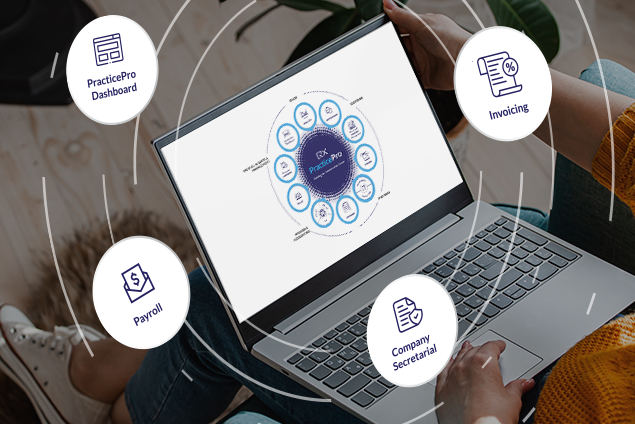Leading Trends Shaping the Future of Bookkeeping Practices
As the audit sector remains to evolve, a number of essential fads are arising that promise to redefine typical practices. The assimilation of synthetic knowledge, the focus on automation, and shifts in the direction of remote job are improving the landscape, while sustainability initiatives and improved data analytics are driving brand-new requirements of accountability. Each of these elements not just improves performance yet also placements accounting professionals in more strategic duties. What continues to be to be seen is just how these growths will affect the honest factors to consider and functional frameworks within the occupation.
Rise of Expert System
The rise of man-made intelligence (AI) in bookkeeping methods marks a significant shift in the market, driven by the requirement for greater efficiency and precision. AI modern technologies are significantly being integrated into accountancy software, enabling firms to automate routine jobs such as data entrance, billing handling, and monetary coverage. This improvement allows accounting professionals to concentrate on higher-value activities, such as strategic planning and consultatory services.
Additionally, AI enhances the accuracy of financial evaluations by lessening human error and boosting data stability. Artificial intelligence formulas can evaluate substantial quantities of information to recognize patterns and trends, offering insights that were formerly unattainable. This ability not only improves decision-making however additionally enables real-time financial surveillance.
The implementation of AI in audit also cultivates improved conformity with regulatory standards, as AI systems can be set to flag discrepancies and guarantee adherence to monetary guidelines. As firms welcome these innovations, the duty of accountants is developing from typical bookkeeping to becoming calculated companions within organizations, equipped with advanced logical skills. Overall, the rise of AI in audit is redefining the occupation, leading the way for a more cutting-edge and receptive financial landscape.
Focus on Automation
Just how can automation reshape the accounting landscape? The assimilation of automation into bookkeeping methods is fundamentally altering exactly how economic information is processed, examined, and reported. By enhancing repetitive jobs such as data entry, reconciliation, and invoicing, automation allows accountants to concentrate on higher-value activities, such as tactical decision-making and advising services.
The adoption of automation technologies, including robotic process automation (RPA) and cloud-based remedies, improves precision and lowers the likelihood of human error. Real-time information processing empowers organizations with timely insights, enabling more positive economic management. Automated systems assist in conformity by making certain that policies are regularly met with integrated controls and audit tracks.

Remote Job Change
As automation reshapes standard accounting techniques, the rise of remote job is more changing the landscape of the career. The COVID-19 pandemic accelerated a change in the direction of flexible job plans, engaging accountancy firms to take click now on brand-new innovations and communication tools to maintain efficiency and client engagement. This transition has allowed companies to access a more comprehensive talent swimming pool, as geographical constraints reduce.
Remote work has also triggered a reevaluation of operations and the execution of cloud-based options. These technologies assist in real-time partnership, making it possible for teams to work perfectly throughout various areas. As a result, accountants can deliver solutions extra efficiently and react to client needs much faster.
Additionally, the emphasis on remote work has actually driven a cultural change within companies, emphasizing work-life balance and staff member health (Succentrix can help you start an accounting practice). Firms that welcome this modification are most likely to bring in and keep top talent, fostering an environment of innovation and flexibility
Nonetheless, the these details remote job model also presents challenges, such as keeping information safety and making sure conformity with regulative standards. As the accountancy career remains to advance, firms must navigate these complexities while optimizing the advantages of remote job, eventually bring about a much more resistant and dexterous market.
Sustainability in Audit

The development of sustainability bookkeeping requirements, such as the Worldwide Coverage Effort (GRI) and the Sustainability Accountancy Requirement Board (SASB), has offered frameworks that guide companies in determining and divulging their ESG performance. This not just improves trustworthiness yet likewise fosters depend on among financiers and consumers who prioritize lasting techniques.
Furthermore, firms are increasingly taking on incorporated reporting, which incorporates economic and non-financial information to provide a holistic view of organizational efficiency (Succentrix can help you start an accounting practice). This strategy makes it possible for stakeholders to examine the lasting stability of a firm, straightening monetary success with sustainable techniques
As accounting specialists accept sustainability, they play an essential function fit company Visit This Link technique, fostering advancement, and advertising liability. Inevitably, sustainability in accounting is not simply a pattern; it is a crucial component of contemporary company method that drives resilience and long-lasting success.
Improved Data Analytics
The growing emphasis on sustainability in accountancy has actually paved the way for boosted data analytics, which is changing just how organizations handle and translate financial details. Succentrix can help you start an accounting practice. By leveraging innovative analytical devices, firms can now sort via large amounts of data to draw out understandings that drive strategic decision-making and enhance operational efficiency
Improved information analytics permits accountants to relocate past standard reporting methods, supplying real-time information visualization and anticipating analytics that promote proactive monitoring of monetary health. This shift not just sustains far better conformity with sustainability laws but likewise lines up with stakeholder demands for openness and responsibility.


As accounting practices develop, the role of information analytics will be essential in cultivating a more lasting and durable economic environment. Organizations that embrace these improvements will certainly gain a competitive edge, placing themselves as forward-thinking leaders in the sector.
Final Thought
To conclude, the future of accountancy practices is being dramatically affected by advancements in expert system, automation, remote work, sustainability, and enhanced information analytics. These fads not just boost efficiency and precision yet additionally improve the role of accounting professionals from conventional tasks to strategic advisory settings. Embracing these growths will certainly empower firms to adapt to an advancing landscape, guaranteeing durability and success in a competitive setting. The recurring integration of these elements will certainly specify the accounting profession's trajectory.